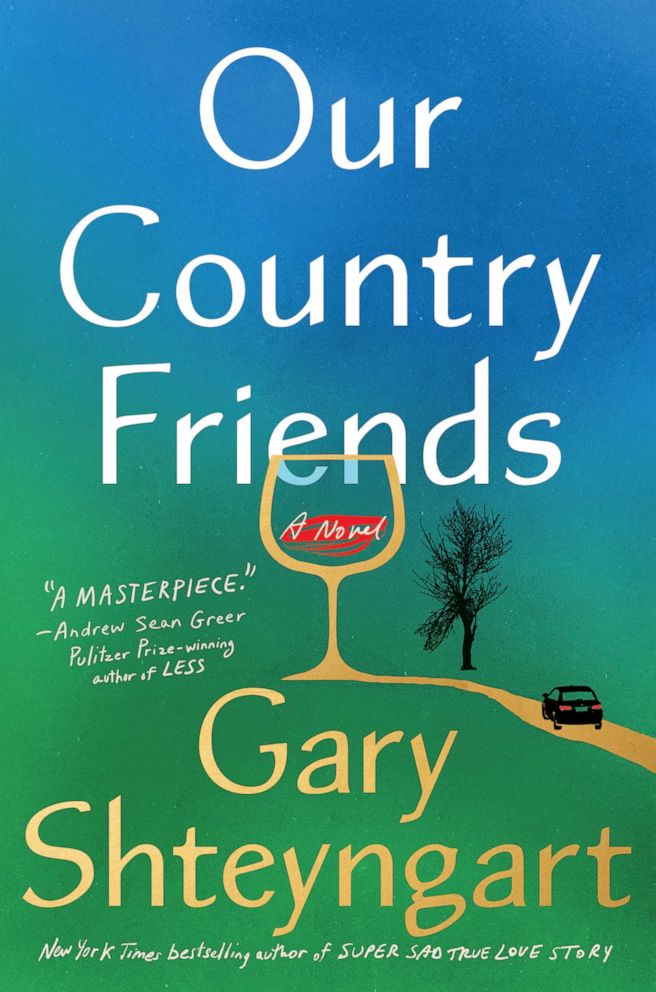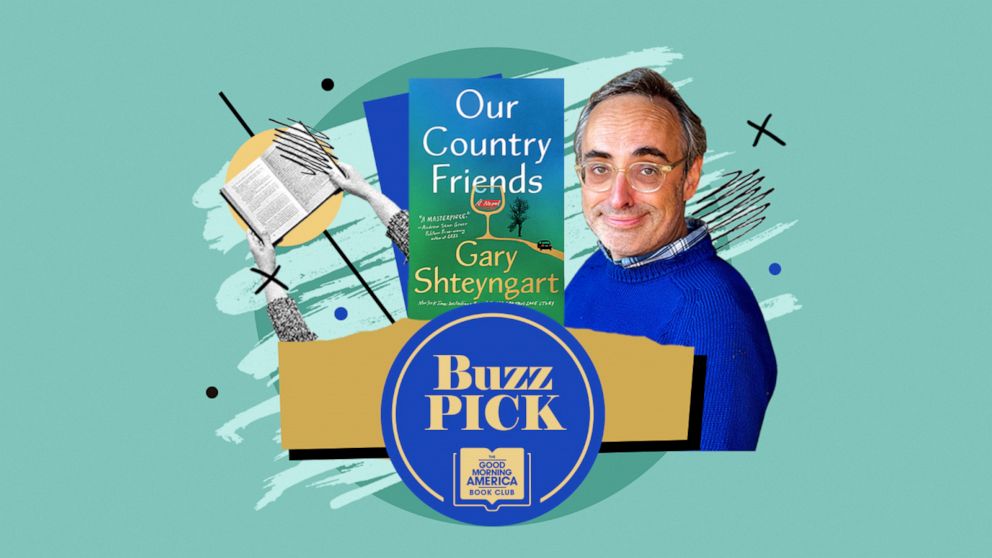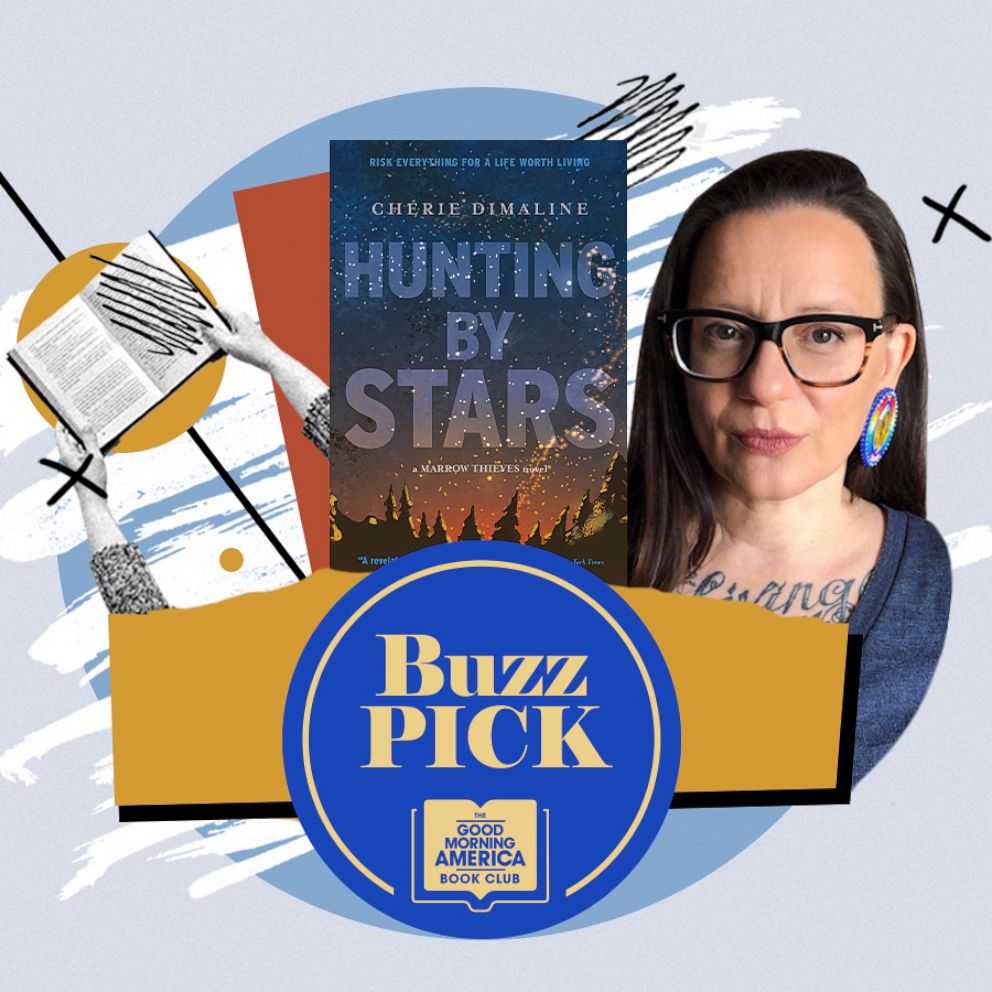'GMA' Buzz Picks: 'Our Country Friends' by Gary Shteyngart
This week's Buzz Pick is about eight friends at the start of the pandemic.
If you have finished our "GMA" Book Club pick this month and are looking for something else to read, check out our digital series, "GMA" Buzz Picks. Each week, we will feature a new book we're also reading this month to give our audience even more literary adventures. Get started with our latest pick below!
This week's "GMA" Buzz Pick is "Our Country Friends" by New York Times bestselling author Gary Shteyngart.
"Our Country Friends" is recommended by Jonah and Ellen Zimiles, owners of Words Bookstore in Maplewood, New Jersey. It is the latest novel by Shteyngart, who is also the author of the award-winning book "Super Sad Love Story."
In his latest novel, Shteyngart tells the story of eight friends who gather in a country house at the onset of the coronavirus pandemic. Over the next six months, new friendships and romances take hold while old betrayals emerge, forcing each character to reevaluate whom they love and what matters most.
The unlikely cast of characters include a Russian-born novelist, his Russian-born psychiatrist wife, their precocious child who's obsessed with K-Pop, a struggling Indian American writer, a wildly successful Korean American app developer, a global dandy with three passports, a young flamethrower of an essayist and a movie star.
"Our Country Friends" is available now wherever books are sold.

Get started with an excerpt below and get a copy here.

'Our Country Friends' by Gary Shteyngart
Shteyngart's latest novel is about eight friends who gather in a country house at the beginning of the COVID-19 pandemic.
- $25.76
- $28
Read along with us and join the conversation all month long on our Instagram account @GMABookClub or via the hashtag #GMABookClub

*****
The House on the Hill was in a tizzy.
Workmen’s trucks streamed up the long gravel driveway. Two sets of plumbers from both sides of the river had been summoned to dewinterize the five bungalows behind the main house, and they did not care for one another. A broken set of windows in one bungalow had to be replaced posthaste, and a family of field mice had chewed through the electrical cable powering another. The handyman, who did not live on the property, was so overwhelmed by the state of affairs, he retreated to the extensive covered porch to eat a cheese sandwich in long deliberative bites. The mistress of the house, Masha, had lowered the shades in her first-floor office to escape the cacophony of modern tools and loud country cursing. At times, she would peek out to note the surfaces that would have to be wiped down after the workmen left. Natasha (who liked to go by Nat), her eight-year-old daughter, was upstairs, illuminated by a screen in the darkness of her room, in a lonely public world of her own.
The only happy member of the household was Alexander Borisovich Senderovsky, known as Sasha to his friends. “Happy,” we should say, with an asterisk. He was agitated as well as excited. A windstorm had brought down the heavy branches of two dead trees flanking the driveway, scattering the vast front lawn with their dead white rot. Senderovsky liked to expound at length upon the “entropic” nature of his estate, the way all manner of growth was allowed to go its own way, sumacs elbowing out more well-heeled plants, ivy poisoning the perimeter, groundhogs bringing destruction upon the gardens. But the scattering of dead tree limbs made the House on the Hill look apocalyptic, the very thing Senderovsky’s guests were coming up to escape. The handyman claimed a bad back and was not handy enough to remove all the tree limbs on his own, and the so-called tree guy had gone missing. Senderovsky, in his athletic pants and wildly colored dressing gown, had tried to move one of these prehistoric-looking branches himself, but the very first heave made him fear a hernia.
“Ah, the hell with it,” he said, and got into his car. A word about the car. Well, not so much about the car, as the way in which it was driven. Senderovsky had only learned to drive three years ago, at the milestone age of forty-five, and only within the limits of a country setting. The highway on the other side of the river unsettled him. He was a fiercely awful driver. The half-empty local roads inspired him to “gun” the engine of his sturdy but inflexible Swedish automobile, and he saw the yellow stripes bisecting the roads as suggestions meant for “less experienced drivers,” whoever that might be. Because he did not believe in road marks or certain aspects of relativity, the concept of a blind curve continued to elude him. (His wife no longer allowed him to drive with their child onboard.) What was worse, he had somewhere picked up the phrase “tooling around.”
And now Senderovsky raced to his errands, mindful only of the speed traps, set with boring predictability on the frayed edges of towns or the school zones, where the fines could be doubled. First, he visited his butchers, two former catalog models from the city, now a husband and wife, who plied their trade out of a barn so red it verged on the patriotic. The two magnificent twenty-five-year-olds, all teeth and coveralls, presented him with a wrapped parcel of sweet and Italian sausages, glistening hamburger patties, and his secret weapon: lamb steaks that clung to the bone, so fresh they could only have been rivaled by a restaurant Senderovsky admired in Rome’s abattoir district. The very sight of meat for tomorrow’s cookout inspired in him a joy that in a younger man could be called love. Not because of the meat itself, but because of the conversations that would flow around it as it was marinated, grilled, and served, despite the growing restrictions on such closeness. By noon tomorrow, his best friends, the ones who had been so hard to bring together during previous summers, would finally unite, brought together by the kernels of a growing tragedy to be sure, but brought together nonetheless, in his favorite place on earth, the House on the Hill.
Of course, someone else was coming, too. Someone who was not a friend. Someone who made Senderovsky, already a drinker, drink more.
With that in mind, he sped to the liquor store in the richest village in the district, which occupied the premises of a former church. He bought two cases of Austrian Riesling at the south transept, another of rosé at the north, along with a fourth case of Beaujolais, wildly out of season, but a nostalgic wine for him and his high-school friends, Vinod and Karen. Ed, as always, would be the hardest to accommodate. Deep in the sacristy, Senderovsky picked out an eighteen-year-old bottle of something beyond his means, two bottles each of cognac and rye, and, to show his frivolous side, schnapps and a strange single malt from the Tyrol. The proprietor, a shaggy Anglo with a rosacea nose peeking out from his loosely worn mask, looked very pleased as he rang up the many purchases, his fingers clad in black disposable gloves.
“Just got a call from the state,” he said to Senderovsky. “They might shut me down any day now as nonessential.” Senderovsky sighed and bought an extra case of the Riesling and two bottles of an artisanal gin he had never heard of. He could picture Ed pursing his lips around a glass and pronouncing it “drinkable.” When the final bill, adding up to just over four digits, meandered out of the machine in many long spurts, Senderovsky’s hand could barely slalom through his signature. A special occasion, he consoled himself.
*****
Excerpted from Our Country Friends by Gary Shteyngart. Copyright © 2021 by Gary Shteyngart. Excerpted by permission of Random House. All rights reserved. No part of this excerpt may be reproduced or reprinted without permission in writing from the publisher.






